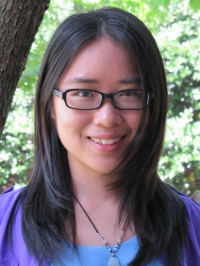2014 SRE Program Participant Profile: Fangyuan Hong

|
Hometown: Ningbo, China |
Why did you apply to the SRE program?
I would like to gain an extensive research experience in mathematical biology, and the SRE program at NIMBioS is very committed to the field. Also, to be honest, I was greatly attracted by the Great Smoky Mountains in Tennessee and hoped to see the synchronous fireflies.
How did you hear about the program?
My advisor highly recommended this program.
What is the purpose of your research?
Our group's research fills in the gap between genetics of coastal populations (like fish, plants, corals, bivalves), and their geographic distribution within their native ranges. Previous studies have investigated the genetic diversity of terrestrial plants growing in either the edge or center of their ranges, but none have extended their scope to coastal or intertidal populations. We would like to use a statistical framework called meta-analysis to synthesize and contrast the results of primary studies that provide high-quality data to test this hypothesis on coastal populations, but are constrained to particular locations around the world.
![]()
NIMBioS is a truly close-knit and dynamic community, a ground from which the SRE program absorbed a lot of nutrients.
![]()
– Fangyuan Hong, SRE participant
What does the research ultimately accomplish? What contributions to science and/or humanity does the research ultimately make?
The research ultimately presents synthesized results from 30-40 primary studies that tested genetic diversity and differentiation of coastal populations. Because no study has investigated how genetic diversity of coastal populations are affected by their geographic distributions within native ranges by the time we started our project, it can potentially give new insights to how conservation genetics protect coastal species.
Describe a typical day on the job.
My group is the early bird. We meet around 8:30 am and have a check-in meeting soon after. For the first month, we read hundreds of primary literatures together, and decided the criteria for excluding and including papers in our meta-analysis. We discussed and consulted each other frequently, and maintained communication either through emails or in-person meetings. For the second half, we would be flooded by programming, model fitting and trouble shooting. Stressful but definitely rewarding!
Tell us something about your field of study we would be surprised to know.
Now it is the era of massive data in almost all science! In addition to learning traditional data collection and statistical analysis, biomathematicians should probably be prepared to playing with big data.
Do you have an interesting "personal side" to your research experiences that will increase human interest in your story?
To add some artistic flavor, I like to think of my research experience as an improv training. Thanks to my colleagues, they teach me how to collaborate and grow as a good improv actress.
What were your favorite parts of the SRE program?
Collaboration!
NIMBioS is a truly close-knit and dynamic community, a ground from which the SRE program absorbed a lot of nutrients.
Dr. Lenhart and Kelly were always readily available to provide office supplies and equipment, connect us to scientists and staff with different specialties, and organize trips to the Great Smokys and Knoxville Zoo. Based on this supportive network, we developed colleagueship while working into friendship outside our projects.
What new experiences did you gain that have helped you today?
I learned to understand concepts across disciplines, plan ahead and responsively and empathetically manage the project. Technically speaking, I gained experience in R programming, meta-analysis, and data visualization. The final stage of results interpretation in the context of conservation biology helped integrate what I learned from courses at Mount Holyoke. I especially appreciate the opportunity to talk with various scientists and mathematicians at NIMBioS. They led me to reflect on the future as well as the drawbacks of interdisciplinary studies.
What advice would you give someone who's interested in/curious about participating in the program?
I would recommend getting to know your potential mentors and project well (and probably the weather and the city, which I personally believe to be critical for life quality). Get good recommendation letters from faculties who know you well, and have evidence showing that you are well prepared for research, even if you do not have relevant experience before. If you are uncertain about your possibility, just talk to people and do it. In case you need it, I am always happy to share my experience and answer questions via email (hong22f@mtholyoke.edu).
Would you recommend our program to others?
Absolutely yes! I highly recommend this program to any undergraduate who is interested in mathematical biology. It does not matter if you only specialize on mathematics, biology or computer science. What matter is the willingness to cultivate a flexible mindset to absorb insights from interesting people and different disciplines. This will add invaluable assets to our academic careers.
What do you do outside of work (hobbies, sports, associations, activities)?
Although sometimes the research may require extra work in the evenings or weekends, I got ample opportunity to explore Knoxville. I loved cooking in the full kitchenette of the residential hall we live, and occasionally swimming in T-Recs. I also enjoyed working in an environmental NGO (CYCAN) that promotes youth awareness in environmental issues in China. This sometimes takes away opportunities to hang out with roommates in the Market Square, but I also gained experience from it of basic citizen science.
Where do you see yourself in 10 years?
Just graduated from a PhD program, not affluent or even short of money, but still passionate about my job and career
NIMBioS
1122 Volunteer Blvd., Suite 106
University of Tennessee
Knoxville,
TN 37996-3410
PH: (865) 974-9334
FAX: (865) 974-9461
Contact NIMBioS


